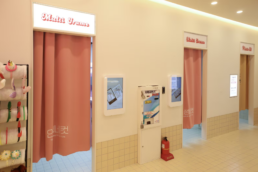The Internet of Things (IoT) is an emerging technology that healthcare startups leverage. IoT is perfect for exchanging data & information between devices and systems, which is why there has been a rise in Innovative IoT Healthcare startups in Korea over the last decade. Thanks to this technology, many physicians in Korea can now offer quality care. IoT is shaping the future of the healthcare industry. It offers real-time patient care and monitoring using cutting-edge solutions developed by startups in Korea.
Some examples of IoT Healthcare devices include:
- Biometric scanners
- Bioprinters
- Air quality sensors
- Glucose/blood monitoring devices
- Remote temperature monitors
- Fitness wearables
- Sleep monitors
- and more…
The list can go on and on. Now many IoT Healthcare startups in Korea are incorporating AI technology into their devices for better patient care and engagement. Below is a list of IoT Healthcare startups creating devices that have the potential to revolutionize the healthcare industry not just in South Korea but in the world. We also have an article on genetics startups in Korea you should also check out.
IoT Healthcare Startups in Korea to Know
ROKIT Healthcare
 The top IoT Healthcare startup in Korea is ROKIT Healthcare. They develop safe and effective organ regeneration platform services. They are the developers of a 4D bio-printer/organ regenerator called Dr. INVIVO 4D, which is the world’s first sterile, all-in-one 4D organ regenerator, used to regenerate the skin as a treatment for diabetic foot ulcers. It was developed for biomedical researchers and material engineers to pattern cells, biomolecules, and polymers to explore multi-material 3D composite structures, from tissues to novel biocompatible materials. ROKIT Healthcare received a series C funding round from DRADS Capital, a biotech-specialized investor based in the US and Canada.
The top IoT Healthcare startup in Korea is ROKIT Healthcare. They develop safe and effective organ regeneration platform services. They are the developers of a 4D bio-printer/organ regenerator called Dr. INVIVO 4D, which is the world’s first sterile, all-in-one 4D organ regenerator, used to regenerate the skin as a treatment for diabetic foot ulcers. It was developed for biomedical researchers and material engineers to pattern cells, biomolecules, and polymers to explore multi-material 3D composite structures, from tissues to novel biocompatible materials. ROKIT Healthcare received a series C funding round from DRADS Capital, a biotech-specialized investor based in the US and Canada.
“With our extensive experiences in the biomedical industry, ROKIT Healthcare will make every effort to continue growing as an innovative global company by expanding its business domain ranging from personalized organ regeneration to anti-aging markets,” said the CEO of ROKIT Healthcare, Seokhwan You.
Rokit Healthcare has finished its Series C funding round, bringing its total funding, and will look to go public in 2022. Their focus is to continue to conduct more clinical trials in South Korea, the US, Europe, and Asia.
MEDI FUTURES
 Korean Biotech Startup MEDI FUTURES is an ultrasound company. They commercialized ultrasonic endoscopic disk surgical instruments and enzyme-free ultrasound stem cell separators based on ultrasonic platform technology. Moreover, these devices minimize tissue damage and help patients recover faster. MEDI FUTURES does 80% of its sales overseas. The startup has raised over $10 million in funding from Korean VC firms such as ST Capital and Samho Green Investment. In addition, MEDI FUTURES is a part of the Future Unicorn program conducted by the Ministry of Science and ICT.
Korean Biotech Startup MEDI FUTURES is an ultrasound company. They commercialized ultrasonic endoscopic disk surgical instruments and enzyme-free ultrasound stem cell separators based on ultrasonic platform technology. Moreover, these devices minimize tissue damage and help patients recover faster. MEDI FUTURES does 80% of its sales overseas. The startup has raised over $10 million in funding from Korean VC firms such as ST Capital and Samho Green Investment. In addition, MEDI FUTURES is a part of the Future Unicorn program conducted by the Ministry of Science and ICT.
DAVINCI COG
MEDI FUTURES are the creators of DAVINCI COG, an absorbable medical-use barbed suture that is highly precise and safe. In one year, they have been able to do over $2 million in sales. They obtained CE certification in 2020 and will look to increase their sales in the European market. Furthermore, they will also collaborate with American companies to expand their exports of surgical devices.
“MEDI FUTURES is able to develop medical devices at a micrometer scale that can be absorbed by the body. We will be working to make our products applicable not only for surgery and beauty care but also in other areas of medical treatment such as ophthalmology and dentistry,” said the CEO of MEDI FUTURES, Kim Ji-min.
Healcerion
 Korean MedTech startup Healcerion offers a mobile-based ultrasound system that provides physicians and patients with a portable handheld ultrasound device. Their device, the SONON 300L, recently got FDA approval and can now enter the US market. Their flexible handheld device is 1/10 the cost of a traditional ultrasound machine. Moreover, it is an advanced imaging device that can be used anywhere if you download the app from Google Play or the App Store. Therefore, the tablet or smartphone will then act as a display for the device.
Korean MedTech startup Healcerion offers a mobile-based ultrasound system that provides physicians and patients with a portable handheld ultrasound device. Their device, the SONON 300L, recently got FDA approval and can now enter the US market. Their flexible handheld device is 1/10 the cost of a traditional ultrasound machine. Moreover, it is an advanced imaging device that can be used anywhere if you download the app from Google Play or the App Store. Therefore, the tablet or smartphone will then act as a display for the device.
The SONON 300L is rechargeable (3-hour battery life) and only weighs 13 ounces. It can also support medical imaging protocols such as DICOM (Digital Imaging and Communications in Medicine) and PACS (Picture Archiving and Communication System). In addition, it also provides a new diagnostic ultrasound option for retail clinics, urgent care centers, mini-hospitals, and home health care providers. Furthermore, it will help rural and third-world regions where cost, space, and mobility requirements had previously put traditional ultrasound out of reach.
“New Healcerion ultrasound scanners will take advantage of the next-generation technology, making them more compact and easier to use,” said CEO of Healcerion, Dr. Benjamin Ryu.
Algocare

Algocare is an IoT healthcare/wellness startup that provides personalized nutrition as a service (NaaS) through an IoT nutrition management device and application. The startup plans to expand from personalized nutrition management services to chronic disease medication management and non-face-to-face medical services. Algocare has an AI doctor developed by full-time doctors, pharmacists, and researchers. In addition, they recently won the CES Innovation Awards at CES 2022 in 3 categories for the 2nd consecutive year. Some of their Key Products include:
- AI Doctor – Analyzes the user’s health data and provides solutions
- IoT Device – Provides a combination of personalized nutritional supplements
- Millimeter nutritional supplements – 4mm-sized nutrient supplements
- Healthcare app – The app manages your health status and records your dosage
Sky Labs

IoT Healthcare Startups in Korea – Sky Labs is known for a ring-type Cardio Tracker called CART. It helps with the continuous monitoring of atrial fibrillation. Atrial fibrillation is an irregular heart rhythm that can cause blood clots and even lead to heart failure or stroke. Atrial fibrillation occurs in 25% of people in their 40s or older. Customers can wear the CART ring daily. In addition, it is both waterproof and dust-proof. Furthermore, the collected atrial fibrillation data can help doctors diagnose atrial fibrillation.
They are doing clinical trials at Seoul National University Hospital and working with global pharmaceutical companies like Bayer and Sanofi.
Their focus for 2023 will be to seek sales licenses in the US and Europe to expand their share in the global market. Sky Labs was established in 2015; they first saw its potential in the European market when it was picked at the startup program Grants4Apps Accelerator by Bayer in 2017. Furthermore, in 2018, the company won the top digital health care sector award at the European Society of Cardiology Congress, the world’s largest cardiovascular congress. In addition, in 2019, Sky Labs got selected for the YIA (Young Investigator Awards) from HRS (Heart Rhythm Society). This was the first time a Korean team had won the award and was selected as a “Tech Pioneer” by the World Economic Forum for the second time in Korea.
“From the beginning, our goal was to penetrate Europe and the US. We will also launch the product in South Korea so we have applied for the Ministry of Food and Drug Safety’s approval, but it is only for limited usage due to government regulations here,” said Sky Labs CEO Lee Byung-hwan.
WellsCare
 Korean IoT Healthcare startup WellsCare manufactures and sells home smart healthcare devices. Their main product is the IASO, a wrist-sized, cold laser device that helps with pain relief. Therefore, think of IASO as a stylish, comfortable, and safe home-care laser pain therapist. It uses Low-Level Laser Therapy (LLLT), a type of light therapy technology that is safe and has a number of verified pain-relieving effects. In addition, it provides a customized healthcare service that connects with its smartphone app.
Korean IoT Healthcare startup WellsCare manufactures and sells home smart healthcare devices. Their main product is the IASO, a wrist-sized, cold laser device that helps with pain relief. Therefore, think of IASO as a stylish, comfortable, and safe home-care laser pain therapist. It uses Low-Level Laser Therapy (LLLT), a type of light therapy technology that is safe and has a number of verified pain-relieving effects. In addition, it provides a customized healthcare service that connects with its smartphone app.
WellsCare was able to raise its series A from the Credit Guarantee Fund. The investment will go towards clinical research at Korea’s top university hospitals. Furthermore, they will also look to expand into the global market and partner with pain-related cream and sports marketing companies.
THE.WAVE.TALK
 Korean Biotech sensor startup THE.WAVE.TALK developed a laser sensor that is 10,000 times more sensitive than the conventional options out there. The current method for bacteriological analysis requires an expert to collect the samples. Then the expert needs to culture it or use expensive precise equipment that can take days. The technology created by THE.WAVE.TALK can detect a low concentration of bacteria on much larger samples. Working on much larger samples takes only seconds to identify different species of bacteria through their deep learning system. Moreover, their bacteria sensor can be attached to IV solutions tubing. Therefore, this technology will ultimately decrease the total costs for diagnosis by cutting down the time and labor efforts required to test nano and micro-particles.
Korean Biotech sensor startup THE.WAVE.TALK developed a laser sensor that is 10,000 times more sensitive than the conventional options out there. The current method for bacteriological analysis requires an expert to collect the samples. Then the expert needs to culture it or use expensive precise equipment that can take days. The technology created by THE.WAVE.TALK can detect a low concentration of bacteria on much larger samples. Working on much larger samples takes only seconds to identify different species of bacteria through their deep learning system. Moreover, their bacteria sensor can be attached to IV solutions tubing. Therefore, this technology will ultimately decrease the total costs for diagnosis by cutting down the time and labor efforts required to test nano and micro-particles.
THE.WAVE.TALK is backed by KAIST and VC firms such as Naver’s D2Startup Factory, Estech Pharma, Bluepoint Partners, Big Basin Capital, and LB Investments, just to name a few. They have an accumulated total of approximately $6 million in funding to date.
“The likelihood of survial from a bacterial infection drops by the hour. By diagnosing a given bacteria quicker, we can help find the right antibiotic for the infection faster, said Kim Young-dug, Co-founder and CEO of THE.WAVE.TALK
SKIA
Korean startup SKIA develops technology enabling the projection of lesions from CT/MRI directly onto a patient’s body accurately. Their technology allows doctors to virtually visualize the lesion’s location on the body as if you are watching a sci-fi movie. Their AR solution reduces surgical deviations and provides a safe surgical environment for patients. Therefore, by scanning the patient’s body with a 3D depth camera, they are able to create a 3D image of the patient’s body. This technology will be very effective in operations that need to avoid blood vessels, like in an emergency operation or a biopsy on organs. Furthermore, their future focus will be on applying this technology to future medical devices such as robot surgery, MND, projectors, and more.
VPIX Medical
 Korean medical startup VPIX Medical provides a different way of observing cells through an innovative scanning method. Therefore, they are developing a research instrument to enhance biological and medical research. This is done by providing a solution for in-vivo imaging. In addition, they are looking to create a handheld microscope that can be used during cancer surgery. Therefore cells can be visualized in real-time without cutting tumor tissues. In addition, surgeries will be completed faster, leading to faster patient recovery.
Korean medical startup VPIX Medical provides a different way of observing cells through an innovative scanning method. Therefore, they are developing a research instrument to enhance biological and medical research. This is done by providing a solution for in-vivo imaging. In addition, they are looking to create a handheld microscope that can be used during cancer surgery. Therefore cells can be visualized in real-time without cutting tumor tissues. In addition, surgeries will be completed faster, leading to faster patient recovery.
HUINNO

Huinno develops patch-type electrocardiogram devices that can provide early detection of atrial fibrillation, a type of arrhythmia. In addition, their product is called MEMO, and clinical trials at Seoul National University Bundang Hospital showed that it increased arrhythmia and heart disease diagnosis rates. MEMO offers 14-day continuous monitoring through its ECG solution.
MediThinQ

MediThinQ is the creator of a wearable scope called MetaSCOPE. It is the world’s first wearable scope that combines a high-performance magnifying camera with Eyes Up Display technology. Images taken from the camera are instantly seen on the wearable display. Moreover, no customization is needed, and doctors can zoom in and out with a wide range of motion. In addition, doctors can record and save their procedures easily by just pressing the record button on the app. The recording gets automatically saved onto the phone.
Related Posts
Freight service startups in Korea for Cargo Transportation
January 17, 2024
Startups in Korea developing AI-powered Chatbots
January 25, 2024
Genetics Startups in Korea Changing the Future of Healthcare
February 7, 2024







